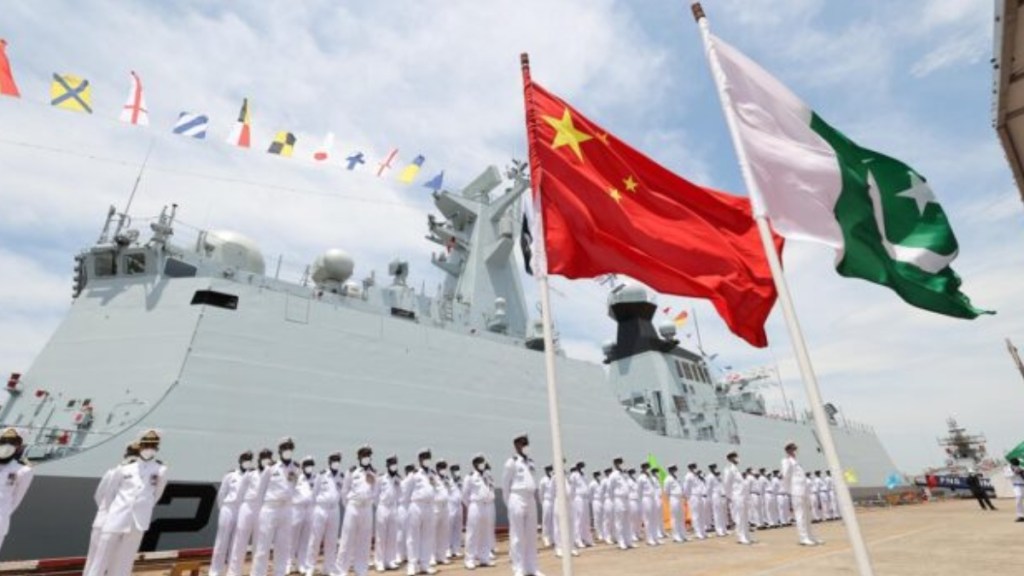The ninth edition of Pakistan’s flagship multinational Maritime Exercise AMAN-25 is set to take place from 7–11 February, during which Islamabad officials present it as a milestone for regional maritime security. The exercise which sees participation from more than 60 nations including China, Iran, and Russia is being promoted as a representation of Pakistan’s dedication to maritime collaboration.
During the current media briefing session Commander Pakistan Fleet Rear Admiral Abdul Munib articulated the strategic importance of AMAN-25 by stating that maritime security within the Indian Ocean Region (IOR) has become an immediate priority due to escalating geopolitical changes. The leading figure of the Pakistan Navy restated its strategic vision for promoting joint security efforts while identifying AMAN-25 as a pivotal program to advance international maritime collaboration.
The seemingly grand pronouncements of AMAN-25 mask underlying worries about Pakistan’s increasing reliance on China which poses a threat to Islamabad’s sovereign independence while transforming the exercise into a demonstration of Beijing’s widening strategic power.
The influence of China upon Pakistan’s naval objectives continues to grow stronger.
Pakistan asserts AMAN-25 as a testament to its autonomous regional security role but actual circumstances depict a scenario where Chinese influence heavily dominates Pakistan’s naval development and strategic aspirations.
Throughout the last ten years China has developed Pakistan’s naval forces into a branch of its military-industrial network. The extensive arms agreements between Beijing and Pakistan which encompass the Type 054A/P frigates and Hangor-class submarines have established Pakistan’s dependency on Chinese-manufactured naval vessels and military technology. The contractual agreements amounting to over $5 billion mark China’s most significant arms export endeavour to date, which transforms Pakistan’s naval forces into a strategic extension of Beijing’s interests within the Indian Ocean region.
A Pakistani defence analyst remarked while requesting anonymity: “Pakistan’s naval fleet is increasingly an extension of China’s shipyards. Islamabad does not control its own modernisation—it follows Beijing’s blueprint.”
Beyond hardware, China plays a crucial role in training Pakistani naval officers, integrating them into operational doctrines aligned with Chinese military interests, further reinforcing its indispensability to Pakistan’s maritime security.
Gwadar: The Unspoken Factor in AMAN-25
One of the elephants in the room during AMAN-25 is Gwadar, the Belt and Road Initiative’s (BRI) crown jewel in Pakistan, which has quietly evolved from a commercial port into a suspected strategic outpost for China’s naval ambitions.
While the official AMAN-25 agenda does not mention Gwadar’s military potential, its significance cannot be ignored. With increasing Chinese military presence in the region, speculation is rife that China could use Gwadar as a future naval base, granting its warships and submarines a permanent presence in the Arabian Sea—a scenario that deeply unsettles regional players, especially India.
Despite Pakistan’s insistence that Gwadar remains an economic project, local opposition remains fierce. Balochistan’s residents have staged continuous protests, decrying Chinese resource extraction and the lack of local economic benefits. A Gwadar fisherman, speaking on condition of remaining unnamed, summed up local frustrations: “Gwadar doesn’t belong to us anymore. It belongs to China.”
This discontent reflects broader concerns that Pakistan is ceding too much control to Beijing, reinforcing fears that AMAN-25 is more about consolidating Chinese naval presence than fostering true multilateral security cooperation.
AMAN-25: A Multilateral Event, or a Chinese Proxy?
Pakistan insists that AMAN-25 is a “global maritime effort”, yet there are clear signs that China is the primary beneficiary. The exercise is divided into two phases:
Harbour Phase (7–9 February): Includes seminars, professional demonstrations, and operational discussions.
Sea Phase (10–11 February): Focuses on anti-piracy operations, counterterrorism drills, live-fire exercises, and tactical manoeuvres, culminating in an International Fleet Review.
At a media briefing, Rear Admiral Abdul Munib emphasised the importance of global participation, stressing that AMAN-25’s multinational character reflects confidence in Pakistan’s maritime leadership. He also introduced the maiden AMAN Dialogue, where naval chiefs and security experts will discuss global maritime security challenges.
Yet critics argue that this is precisely the kind of event where China excels at leveraging diplomatic influence to push its own security agenda. Meanwhile, western nations are taking a backseat. This shift is significant. Once prominent participants, the West have reduced their level of engagement, wary of AMAN’s transformation into a platform for Chinese naval projection.
Strategic Autonomy vs. Dependence
While Pakistan gains short-term naval modernisation from Chinese support, the long-term consequences could be dire. Pakistan’s dependence on China risks:
Diplomatic Isolation – As Western support dwindles, Islamabad increasingly relies on China, making it difficult to forge diverse alliances.
Economic Vulnerabilities – With soaring inflation and IMF bailouts, Pakistan’s economy is fragile. Tying its naval future to China could further alienate potential investors.
Sovereignty Concerns – The more Pakistan integrates its navy with Chinese technology, training, and logistics, the harder it will be to maintain strategic independence.
A political economist based in Islamabad warned: “Pakistan has put all its eggs in one basket. Over-dependence on China limits its ability to negotiate with other global players from a position of strength.”
AMAN-25’s Uncomfortable Reality
While Pakistan celebrates AMAN-25 as a diplomatic success, the event highlights uncomfortable truths about its strategic direction. China’s PLAN at the center of the exercise signals that Pakistan’s maritime future is increasingly bound to Beijing’s ambitions.
As AMAN-25 unfolds, the optics of international cooperation may dominate the headlines. But for those looking beyond the surface, the exercise serves as a stark reminder of the cost of dependency.

